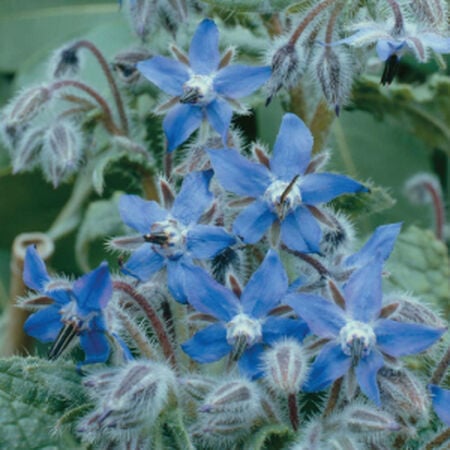Common, Borage Seed
Key Attributes
Key Attributes
Product Details
Weight
0.009Depth
0.1Height
4.5Width
3.25Plant Height
18-30"Botanical Name
Borago officinalisSeed Type
SeedSeeds Per Gram
49Seeds Per Pound
22,400Packet
50 SeedsSow Depth
1/4"Seeds Per Ounce
1,400Breed
Open-pollinatedSun
Full SunLife Cycle
AnnualSow Method
Direct SowTransplantCategories
HerbGermination
11,12,13,14,8,9,10Days To Maturity (# Days)
50Components
Growing Instructions
![]() Learning Download: How to Grow Borage
Learning Download: How to Grow Borage
Borage is an herb that grows edible flowers. The star-shaped flowers have a mild cucumber flavor and are great added to salads or used as garnishes. In addition to adding it to salads, the leaves can be used to make tea. Borage plants can reach up to 2 feet in height and is native to the Middle East. Although the plant is an annual, it grows quickly and reseeds itself.
Before Planting: If planting in a garden, plant borage near strawberries as this will attract bees to the
garden. If starting seeds indoors, plant three to four weeks before the last frost date. When planting, choose a site protected from the wind as borage plants can be delicate and easily blown over.
Planting: Sow borage seeds directly into the garden after all danger of frost has passed. Plant seeds ¼ to ½ inch deep in rows set 12 inches apart in an area that receives full sun. If starting seeds indoors, plant three to four weeks before the last frost date. To ensure a long harvest season, sow seeds every four weeks.
Watering: Water borage often to prevent the plant from drying out, but be careful not to let the soil become soggy.
Fertilizer: Although borage doesn’t require much fertilizer other than amending the soil with compost prior to planting, the plant itself can be used as a fertilizer or a cover crop.
Days to Maturity: Pick the flowers before they have fully bloomed. (See variety for days to maturity)
Harvesting: Once borage matures, harvest the leaves and flowers as needed. Remove the leaves and flowers from the plant with your fingers or with scissors. The plant leaves do not dry well, so use them fresh.
Tips: Plant borage near strawberries to bring bees to the garden. It is also said that the plant enhances the flavor of tomatoes if planted near each other.
Shipping Schedule
Our Seed Promise
 "Agriculture and seeds" provide the basis upon which our lives depend. We must protect this foundation as a safe and genetically stable source for future generations. For the benefit of all farmers, gardeners and consumers who want an alternative, we pledge that we do not knowingly buy or sell genetically engineered seeds or plants.
"Agriculture and seeds" provide the basis upon which our lives depend. We must protect this foundation as a safe and genetically stable source for future generations. For the benefit of all farmers, gardeners and consumers who want an alternative, we pledge that we do not knowingly buy or sell genetically engineered seeds or plants.
The mechanical transfer of genetic material outside of natural reproductive methods and between genera, families or kingdoms, poses great biological risks as well as economic, political, and cultural threats. We feel that genetically engineered varieties have been insufficiently tested prior to public release. More research and testing is necessary to further assess the potential risks of genetically engineered seeds. Further, we wish to support agricultural progress that leads to healthier soils, to genetically diverse agricultural ecosystems, and ultimately to healthy people and communities.
To learn more about the "Safe Seed Pledge" please visit www.councilforresponsiblegenetics.org.

